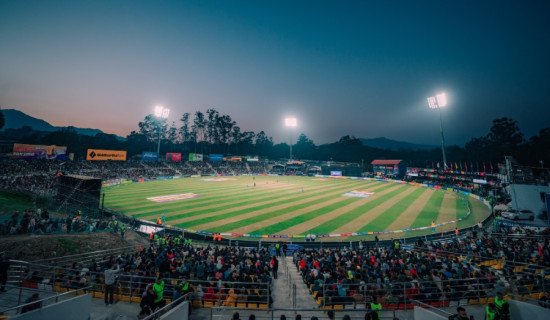- Sunday, 7 December 2025
Democratising Nepal’s Democracy
The much-demanded good governance by the Nepali youth is only possible through democracy, as it keeps people at the centre of governance. A democratic government is for all the people, by all the people and of all the people. Nepali people wanted democracy nearly 80 years ago. Over these years, though people’s participation in governance has increased substantially, Nepal has yet to realise all the inherent virtues of democracy. Democracy is underperforming, and it has been betrayed in many instances. Politicisation of administration and society, lack of fairness in almost all state affairs, weakening ethics and morality, dimming economic prospects, growing dissatisfaction with the functioning of the government, and weakening national integrity are just a few seemingly apparent maladies of our democracy. These are both causes and effects of bad governance in the country. This resulted in the Gen Z protest recently, demanding a thorough servicing of our democracy. Since the only alternative to democracy is a better democracy, this article is an attempt to provide some suggestions for democratising our existing poor democracy.
Democratic practices
Democratising democracy is continuously expanding or deepening democratic practices and principles so that they are more inclusive, participatory and equitable for everyone. Politically, it's about making democracy more accessible to everyone, ensuring that all voices are heard, and that power isn't concentrated in the hands of a few. The optimum form of democracy is not just about voting or political representation or enjoying the right to speak. Rather, it is a deeper transformation in the lives of all people. It is about expanding opportunities, ending all forms of feudal and autocratic practices. It is about ending 'Jhole' culture and party colonialism. It is also about freeing individual conscience and expanding real freedoms. Democratising democracy needs going beyond the mechanical process of forming political parties, electing representatives, forming government and making laws.
Nepal’s democracy needs further reforms. There are several ways to do this. First is to promote people’s greater participation in governance so that citizens are directly involved in the state’s decision-making processes. Wider participation helps break the existing dictatorship within our political parties and all other public institutions, thereby ending vested policy-making. Currently, people just vote during elections, and after this, leaders hardly consider public accountability and regard themselves as the masters, though they are just the agents of the people. To promote greater public participation, wider mechanisms like town hall meetings, online feedback, citizen assemblies and referenda should be designed and executed regularly. Political parties and administration must be open to receiving public and expert opinions and act accordingly. The Delay in doing this has resulted in Gen Z protests that have taken away the precious lives of over 75 people and billions worth of public and private properties recently.
Greater decentralisation is the second element to make our democracy better functioning. Both the political parties and the federal government still have the tendency to centralise power despite the constitutional mandate of federalism. This is reflected in the existing big size and many powers of our federal government, while provincial and local governments need added power for truly democratising our democracy at the grassroots level. Since these subnational governments are the strong pillars of our democracy, they must not be undermined. Unfortunately, provincial and local governments have also shown the same tendency to centralise power instead of delegating it to local levels, ward levels, and community levels. There is a tendency to keep power at the centre of all levels of government. Old political leadership has also been reluctant to empower the youth, who are the true spirit of democracy.
Further ensuring truly inclusive representation at all levels is the third crucial factor for better servicing our democracy. After the enactment of the 2072 constitution, the presence of historically marginalised groups in our governance has increased substantially. This has improved social justice. However, this representation has been concentrated around the elites of the concerned communities. While rich Dalits have been elected or selected for public positions, poor Baahuns, as well as Dalits, continue to remain away from the mainstream. Voices of the poor women are not reflected in our public policies and programmes. The absentee population cannot vote, and there is an inadequate nurturing environment for everyone to realize their true potential. Further reforms in electoral systems, creating extended opportunities, judiciously implementing reservation quotas, and ensuring fair access to voting and civic participation for all are urgent for mending our democracy.
Technology
Fourth, harnessing the benefits of technology is vital for the optimum functioning of our democracy. Modern technology and digital platforms have immense potential for increasing transparency, accountability, reducing corruption, and ensuring easier access for people to engage in state affairs. However, we have not been able to adequately exploit modern technology towards this end compared to our neighbouring countries. Consequently, we have failed to fully realise the benefits of global outsourcing, online voting, digital participatory platforms, open-source transparency initiatives and many other technology-enabled modes of production and service delivery. The recent temporary ban on social media and its consequences reveal the power of technology and people’s attachment to it. Our democracy thrives only with the latest technology.
Political education can make our democracy effective. While our election commission provides voter education, it is vital to provide political and civic education which enables people to understand the complexities of governance, the existing political system, political parties’ hooks and crooks, and the implications of different policy choices. Democracy should serve as a mechanism for expressing a collective will that is more aligned with higher values, such as nationalism, harmony, truth, wisdom, and compassion. Due to inadequate political education, Nepali leaders have failed to demonstrate these virtues in many of their decisions. This kept our democracy from flourishing.
(Dr. Bhusal is a development expert.)















